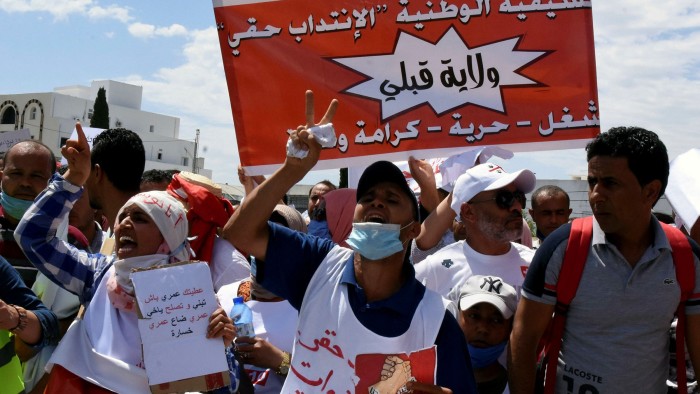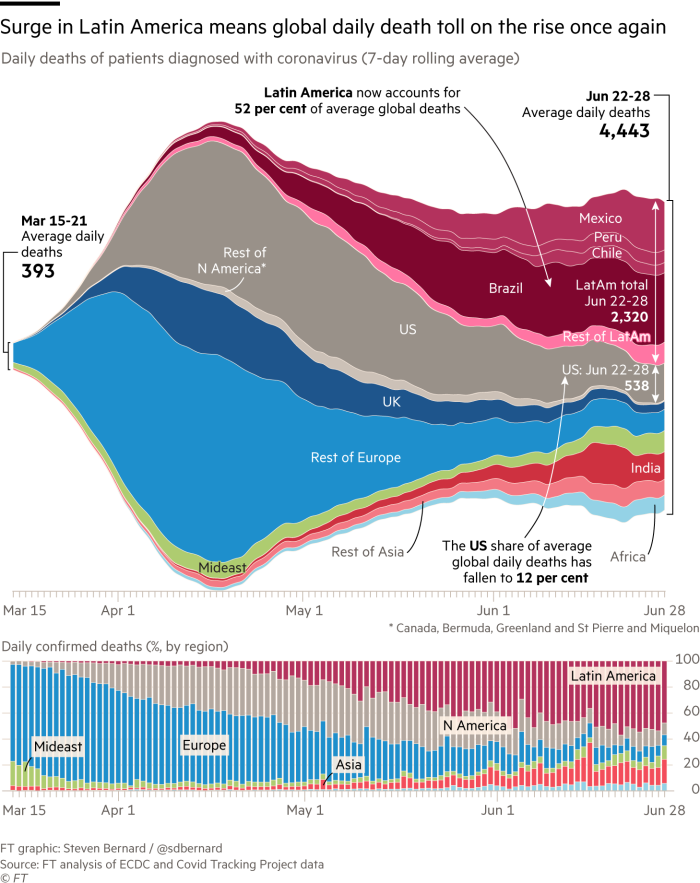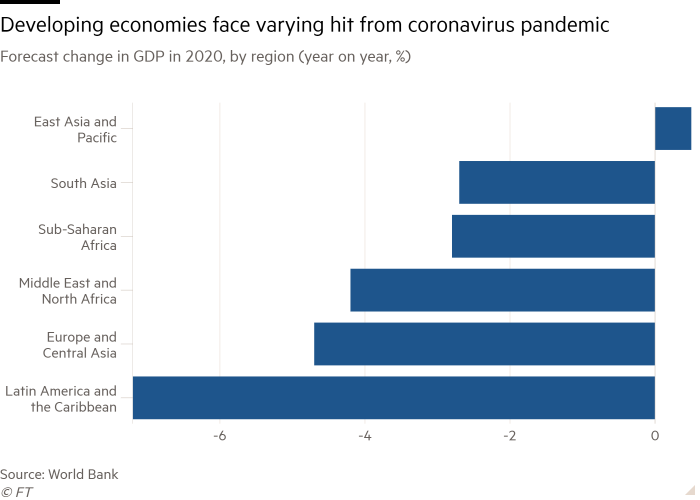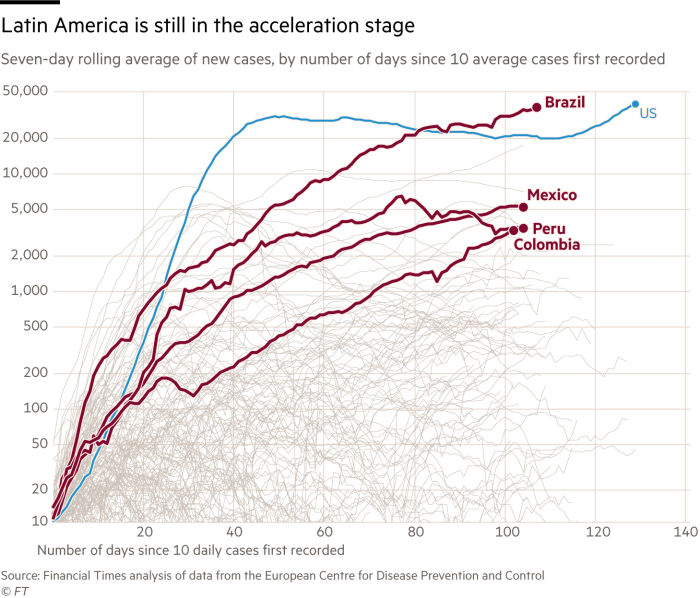Sharing work could ease mental health impact of pandemic

Roula Khalaf, Editor of the FT, selects her favourite stories in this weekly newsletter.
Welcome to FT Health, a monthly guide to the big issues at the intersection of global health and finance. Technology and investment are changing the face of healthcare while coronavirus is bringing an unprecedented focus on the world’s health systems. This newsletter delivers news, interviews, data and the best health journalism from across the web. Please send us feedback via health@ft.com.
FT subscribers can sign up for the email version here and non- subscribers here.
People who have continued to work at least part time during the coronavirus lockdown have far fewer mental health problems than those who have lost their jobs, according to the most comprehensive study of workers across Britain during the pandemic.
Research led by academics at Cambridge university argued that employers should share employment more equitably during the recovery, through shorter working weeks to limit unemployment and the associated rise in mental illness.
The survey mirrors past reports on the stress caused by unemployment. It also highlights options for international policymakers seeking to mitigate the economic impact of Covid-19, including rising treatment costs for the NHS and still more fragile mental health services in lower-income countries.
It found that those who left paid work had poorer mental health than those who remained full- or part-time employed or were furloughed.
A review by the Health Foundation points to a range of studies showing a deterioration in mental health during the pandemic with disproportionately large effects on young people, lower-income households, people with children and living in urban areas, as well as individuals with a pre-existing diagnosis of mental illness.
Coronavirus and its consequences are demonstrating just how closely economics and health are interweaved.
Three questions

Catharina Boehme is chief executive officer of Find — the Foundation for Innovative New Diagnostics. We talked to her after the second round of a pledging summit organised by the EU and Global Citizen at the weekend mobilised a further €6.15bn for coronavirus vaccines, tests and treatments, bringing the total to almost €16bn. The split of how the new money will be spent is not yet known.
How essential are diagnostics in tackling the virus?
Diagnostics are the first line of defence against Covid-19. Testing saves lives. It allows economies to reopen — and stay open. Most importantly, it is actionable now: testing, tracing and isolating confirmed cases works. Aggressive, timely, affordable, quality and sustained testing has proven to be a differentiator in country success. Countries with fragile health systems without strong laboratory networks are being left behind. As the virus gathers pace in India, South America and across the African continent, health systems will be swiftly overwhelmed.
What is Find’s role in the development of diagnostics for Covid-19?
We incentivise developers to enter global health markets where they wouldn’t normally go and provide support to remove bottlenecks and enable access to new tools. For Covid-19, we have seen hundreds of developers stepping up but we still don’t have a simple, easy-to-use, affordable and reliable test that can be made available to everyone. We need an RDT [rapid diagnostic test] that is simple, easy to use and looks just like a pregnancy test.
How should funds be allocated between vaccines, therapeutics and testing?
To drive the global response forward in low- and middle-income countries we need at least €2bn. When we see the split of the pledges [from the first round], it is clear that support for innovation and the rollout of tests is undervalued compared with vaccines, therapeutics and strengthening of public health systems. The €242m pledged to testing [in the first round] was just 2.5 per cent of the total, even if governments seem to understand its urgency and importance. We are hoping that the pledges this time will be a bit more balanced. We have a window of opportunity to ensure that everyone who needs a test can get one. We cannot allow [a delay in] testing to become a bottleneck that a) could delay vaccine introduction overall, and b) could mean that vaccines don’t get to those who need them most, first.
Coronavirus trajectory

WHO chief Tedros Adhanom Ghebreyesus this week marked the six-month anniversary of the first reports of clusters of a “pneumonia of unknown cause” in China. It is also the week that cases passed the 10m mark and fatalities exceeded 500,000. Mr Tedros remarked that the pandemic was speeding up and “the worst is yet to come”. The warning comes as fears grew in the US that new spikes in infections may be hard to control.
For the latest news follow our live blog and browse our free collection of charts and data on the pandemic’s path, lockdown measures and its effect on business and the economy.
News round-up
Financing the fight The WHO published investment cases for four pillars of activity to combat Covid-19: tests, treatments, vaccines and health systems. Here’s a report documenting the UN’s response and its “road map” out of the crisis. (WHO, UN)
R&D tracker A separate tracker shows amounts committed for research and development to fight Covid-19. The largest single contribution is from the US Biomedical Advanced Research and Development Authority. (Policy Cures Research)
Drug wars The US government bought up all stocks of Gilead’s remdesivir, the only branded Covid-19 drug to obtain approval from US regulators. The biotech firm had been attacked for saying it would charge governments $2,340 for a five-day course. Here’s an explanation of the pricing decision. (Guardian, FT, Vox)
Vaccine hunt Global donors pledged more than $8.8bn over five years for child vaccination programmes in low-income countries that aim to save up to 8m lives from diseases such as measles and cholera. FT science columnist Anjana Ahuja charts the obstacles in the path of a Covid-19 vaccine. Watch our interview with Wellcome Trust’s Jeremy Farrar on the search and the lessons learned so far from the pandemic. (FT)
The pandemic and the poor The World Bank highlighted the toll on emerging and developing countries as the crisis tips millions into extreme poverty and leaves “lasting scars” in its wake. The IMF said Africa faced its worst economic shock since the 1970s. Poorer countries may have younger populations that would normally be less likely to suffer from Covid-19 but this benefit is outweighed by limited health systems and closer intergenerational contact. The pandemic is also disproportionately affecting poorer communities within richer countries such as the UK. (FT, Science, Resolution Foundation)

Crisis worsens in Yemen “Huge shortfalls” in humanitarian funding risk starvation for millions of Yemeni children. Even before Covid-19 struck, the country was facing what the UN labelled “the world’s worst humanitarian crisis”, with health systems near collapse and an ongoing civil war. (FT, Unicef)
Ebola progress for DRC An outbreak of Ebola has been declared over in the north-east of the Democratic Republic of Congo after infecting at least 3,470 people — and killing two-thirds of them — since August 2018. A vaccine programme reaching more than 300,000 people was organised by Gavi, the vaccine alliance, and manufacturer Merck. (Nature, Gavi)
Trumping the WHO Repercussions continued from President Trump’s announcement that he wanted the US to leave the WHO. ProPublica has the inside story on how it happened and what followed. European governments are said to be working with the US to restructure the organisation and address US concerns that it has been too close to China. The White House relationship with its own Centers for Disease Control is also being tested. (ProPublica, Reuters, FT)
DfID dismay The UK’s decision to merge its Department for International Development into the Foreign and Commonwealth Office was described as “cultural vandalism” by aid charities. The FT Editorial Board said DfID had become a highly effective actor in development co-operation, especially in Africa, where the bulk of its aid goes. Others argued the change was long overdue. (Guardian, FT, Devex)
Warning on ‘big three’ diseases Some $28bn is needed to prevent two-decades worth of progress on HIV, TB and malaria being wiped out by Covid-19, says a new report. Deaths could as much as double if health systems become overwhelmed by the focus on the pandemic. A separate report highlights the effect of the three diseases on children, killing half a million each year. (Global Fund, Access to Medicine Foundation)
Covid inequalities Black, Asian and minority ethnic populations within richer countries have suffered disproportionately from Covid-19 as the pandemic laid bare existing health inequalities. Here’s a new racial data tracker for the US, and here’s a study that says not all cases are due to socio-economic or behavioural factors. (The Atlantic, Journal of Public Health)
Focus on . . . Covid-19 in Latin America Here’s our Big Read on how poverty and populism are putting Latin America right at the centre of the pandemic. The World Bank said the region could lose “20 years of progress in poverty reduction”. The crisis has had a serious impact on Brazil, the second worst affected country in the world — and Peru, but there is better news in Uruguay. One key problem is sourcing medical supplies. (FT, The Conversation, World Economic Forum, Jama)

US opioid crisis A joint investigation between the FT and US broadcaster PBS tells the inside story of how executives from Insys became the first pharma bosses to be given prison time for their role in America’s opioid epidemic. Watch the programme and listen to our podcast with US pharma correspondent Hannah Kuchler. (FT/PBS)
Best from the journals
Covid-19 and comorbidity More than a fifth of the world’s population or 1.7bn people have at least one underlying health condition that puts them at greater risk of severe Covid-19, a danger that increases with age. Separate data on US victims show the most common underlying health conditions were cardiovascular disease (32 per cent), diabetes (30 per cent), and chronic lung disease (18 per cent). (The Lancet Global Health, CDC)
Healthcare and the poverty trap A group of studies on out-of-pocket health expenses in poorer countries says ensuring income security during periods of ill health needs to become much more prominent in global health research and action. (BMJ)
Child deaths The first study from the Child Health and Mortality Prevention Surveillance (Champs) network documents causes of child deaths in low-income countries. Sub-Saharan Africa and south Asia suffer the most, accounting for 81 per cent of under-5 deaths and 77 per cent of stillbirths worldwide in 2015. A Unicef report lays bare the effect of Covid-19 on 600m children in South Asia where “decades of progress on children’s health, education and other priorities risk being wiped out”.(Lancet Global Health, Unicef)
Antibiotic alarm Fears of growing antimicrobial resistance were fuelled by a study showing potential overprescribing of antibiotics in primary care in low-and middle-income countries. Another study shows the use of antibiotics on crops in poorer countries is more widespread than thought. (PLoS Medicine, CABI Agriculture and Bioscience)
Keep on moving The importance of keeping active during lockdown was underlined by a study showing almost 4m early deaths are prevented each year by people being physically active. The proportion of the population meeting the WHO’s recommended amount of physical activity varies from 33 per cent in Kuwait to 94 per cent in Mozambique. (Lancet Global Health)
Pick of the pods
Role of the UN As part of a series commemorating the United Nations’ 75th birthday, a discussion on how the WHO and other UN entities are responding to Covid-19. (Global Dispatches, 30m)
Healthy cities FT correspondents in London, Paris and New Delhi discuss the health inequalities exposed by the coronavirus pandemic. (FT, 29m)
South America and Covid-19 Discussion on the pandemic’s effect on Brazil, Peru and the wider region. (BMJ Talk Medicine, 20m)
Infection rates We’ve become familiar with R — the effective reproduction number of a disease — over the past few months, but it is a complicated statistical concept and can be misleading. (Guardian Science, 13m)
Health and race Explaining the UK’s new race in health observatory. (BMJ Talk Medicine, 24m)
The month ahead
July 5 Anniversary of NHS
July 6 Aids 2020 conference
July 6 World Zoonoses Day
July 13 State of Food Security and Nutrition report
July 20 Chief Medical Officer England annual report
End notes
Previous issue We’re not all in this together
Contact Email us via health@ft.com, like us on Facebook and follow us on Twitter @fthealth and LinkedIn.
FT Health by email Register here to get FT Health in your inbox on the first Wednesday of each month.
More FT resources You can find all FT in-depth health reports at FT Health Centre.
Coronavirus Business Update Sign up here for our newsletter chronicling the epidemic’s impact on markets, global business, workplaces and our daily lives. The FT is offering a free 30-day trial to this email, which includes access to FT.com.
Final thought
Although the link between racism and poor health has been acknowledged, it has not led to action, writes Kwame McKenzie, chief executive of the Wellesley Institute and professor of psychiatry at the University of Toronto. “From the vantage point of public health, countries need policies that minimise racial discrimination so that there is equity in opportunity and longevity for all. I hope that this will be the lasting legacy of the BLM movement.”
Comments